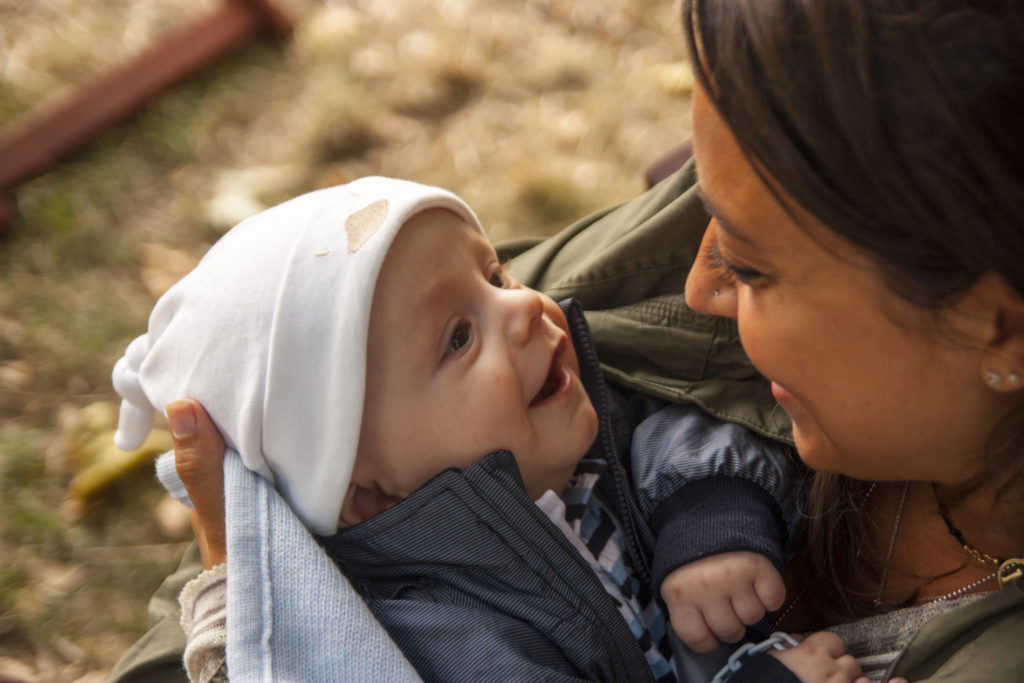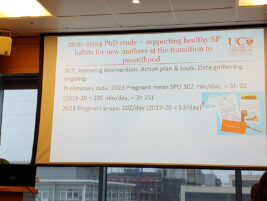Author’s Note
Shelina Bhamani is a PhD Scholar studying Social Science and Education at the Institute of Business Management, Pakistan. Shelina’s major areas of interest lie in early childhood development and teacher education.
This research was supported in part by grants from Institute of Business Management, Pakistan and from the Cupola Foundation. I would also like to acknowledge the supervisory support given by Dr. Prof. Nasreen Hussain ,Ms. Shamira Bhamani and my study participants.
Correspondence concerning this article should be addressed to Shelina Bhamani, Institute of Business Management, and Karachi. Email: shelina.bhamani@gmail.com
Introduction
Fathers’ role traditionally has been considered as a bread earner and role model for practicing moral values in a family. However, in these changing times the role of the father has diversified especially in urban areas and metropolitan cities. Since the growing needs, the rise of solar families (mother, father and children only) and increase in education levels have influenced changing practices of fatherhood to a great extent. Hence, today’s fathers are relatively more involved in their children’s development than before (Palkovitz & Palm, 2009; Bronte-Tinkew et al., 2008; Manlove & Vernon-Feagans, 2002). This has been widely reported by various researchers and parenting organizations across a range of urban settings..
According to Ball, Fatima and Chakma (2012), “These changes have impacted the composition of families {often from extended families to more nuclear families}, increased participation of women in the labour force, increased out-migration of mothers while fathers may remain at home, and in some cases, changing ideas about gender roles and about children’s socio-emotional needs” (p.1). A renowned sociologist has presented reflections on the traditional perceived role of the fathers, when the fathers were considered ‘second adults in the family’ and has argued that fathers who are involved can benefit children as no other adults can (Popenoe, 1996).
Researchers from the West have studied the impact of the father’s involvement on the optimal development of young children through a wide-range of quantitative studies. The lived experiences, perceptions and beliefs of the fathers have been discussed in several qualitative studies.
Fatima’s (2012) fatherhood study in Pakistan emphasized the importance of exploring fathers’ involvement and its impact on very young children. She argued that “researchers are now calling for an expansion of research to address aspects of father involvement that assess(es) both quality and quantity and that examine(s) direct and indirect forms of father involvement in children‘s lives” (p.5).
A growing body of research has investigated the significant role of fathers noting that many child development agencies place primary focus on mothers and their children, thereby paying little or no attention toproviding fathers access to the parenting program interventions (Cowan, Cowan, Pruett, & Pruett, 2005).. Because many research studies have indicated a significant positive relationship between fathers’ involvement and children’s optimal development in the early years of life (Perry, Harmon & Leeper, 2012), greater emphasis needs to be given to involving fathers in prevention efforts. While, the importance of fathers’ involvement appears to be a vital aspect of child development it is important to explore how involvement is defined.
Involvement, in principle, means participation, association, interaction and a bonded relation. Likewise, parental involvement in infancy and early childhood means responsive or proactive care of the children. Hence, an involved caregiver is the one who is responsive to the child’s needs, interacting with the child, providing care and nurture. The University of Virginia (2011) in one of its projects ‘celebrating babies and tots’ has given an insightful definition of responsive care and involvement: conducive environment and caring adult.
Forgarty & Evans (2009) describe fathers’ involvement as a “direct interaction between a father and a child, accessibility, or how available a father is to his child when needed, responsibility or managing and providing resources for a child, and building of social capital or how fathers provide a support network for children as they grow up to contribute to society” (p.1). In early childhood, fathers’ role and involvement target development that facilitates children’s emotional support, physical exercises and cognitive activities (Bronte-Tinkew et al., 2008). Pleck (2004) expresses the view that fathers who are involved in their children’s development are more satisfied and also have children who are more social than children with less paternal involvement.
There are several research studies that provide evidence of strong association between fathers’ involvement and children’s developmental outcomes. Stratton (2006) showed that a father’s presence in the family in and of itself had noticeable impact on the conduct problems in young children. The research study targeted 30 families who received training on managing their child’s conduct problems and later were divided into families with fathers and without fathers. The results of the study established that the families without fathers appeared to be less receptive to the intervention than the families with fathers.
Many investigators have postulated an association between children’s cognitive development and fathers’ involvement. The studies have demonstrated that children whose fathers are involved in the early years of life have shown higher academic performance in their schools than the ones whose fathers were less involved. Moreover, the children of involved fathers have shown greater interest in the schools, activities and have less school readiness issues. Moreover, children of involved fathers have score higher on IQ tests and are less likely to fail in exams (Astone & Rivera, 1999; Furstenberg, & Weiss, 2001; National Center for Education Statistics, 1997; William, 1997).
Researchers who have investigated the emotional wellbeing of young children have argued that the children whose fathers are involved in their development have higher self-regulation. Equally, fathers’ involvement studies accentuate that children of involved fathers have fewer coping and competence issues, self-management problems, and behavioral problems. These children are better in handling stress and new situations and are found to be more resilient (Veneziano, 2000). In addition, quite a few studies have shown a significant correlation between fathers’ involvement and children’s overall life satisfaction (Dubowitz et al., 2001; Flouri, 2005; Formoso et al., 2007; Schwartz & Finley, 2006).
Many research studies have focused on discovering the relationship between fathers’ involvement and social development of young children. (Kato, Ishii-Kuntz, Makino, and Tsuchiya (2002). Children whose fathers were closely involved in their early years of life had more positive peer relationships, were better liked by others, were team builders and participated well in social events.
The physical health of young children and its association with fathers’ involvement has been a growing interest for the researchers involved in early childhood programs. Fathers’ involvement in early childhood protects children from getting involved in drug abuse later in life (O’Connor, Davies, Dunn, &Golding, 2000). Studies have shown that children who reside with their fathers have relatively fewer health problems than the ones who do not.
The relationship and presence of fathers in early childhood also help to decrease negative developmental outcomes of young children. Children who feel close to their fathers and are demonstrably given responsive care appear to have less involvement in criminal activities, delinquencies and anti-social behaviors.
Accordingly, the current study is an initiative towards providing insights to this phenomenon. The study brings forward three noteworthy practices of urban fathers from Karachi, Pakistan. The voices of fathers from non-Western cultures are drastically absent from the corpus of literature accumulating from studies in Western societies. The voices of these Parkistani fathers are significant because they are culturally authentic and contextually appropriate in ways that may help frame studies of larger samples of fathers from developing countries. This study focuses on exploring beliefs, practices, challenges and constraints of the fathers who are involved in the developmental health of their young children in urban settings.
Method
Study Design
This qualitative inquiry followed a case study method with three cases of involved fathers in Karachi, Pakistan. The intention was to expand in-depth understanding of urban fathers’ involvement, roles, beliefs, practices and challenges. The research employed purposive sampling to recruit the participants for the study.
Participants
As for the selection of the cases, the researcher has recruited three involved fathers of different socio-economic backgrounds from Karachi. To recruit the fathers who were involved in their children’s development, the researcher went to the community and inquired from the people and after many suggestions chose the fathers that best fit the criteria. This included their willingness to participate in the study; a minimum of two to four hours on an average each day spent with the child and the fact that they have children less than three years of age. The three fathers were selected from economically affluent-class, middle-level -class and less privileged-class.
Khalid (pseudonym) was the father selected from an affluent socio-economic background. Khalid‘s family lives in an affluent area and is well established in a family business. He manages the business by himself and returns home early in the evening. Once Khalid is back home he often dedicates all his time to his only child, a two-year-old son.
Kabir (pseudonym) was the father selected from middle socio-economic background. . Kabir is a chartered accountant and is employed by a multinational company. He works twelve to thirteen hours a day. He is also preparing for a higher education degree and studies at home. Once he is back home he ensures spending at least two to three hours with his seven-month-old son.
Kasim (pseudonym) was the father selected from an economically underprivileged class. He is a government servant, works seven hours a day and is a father of a one and half year old girl. He lives in a community where there is a lack of appropriate child care facilities and also lack of awareness of educating girls. Kasim, once home, assures giving five hours to his daughter on an average in a day. He says during this time he plays two roles; a father and a teacher.
Measures
The source of data collection for this study was in-depth contextual interviews and observations. The in-depth interview was conducted with a semi-structured interview guide and three days observations were taken in the home setting of the fathers in the study.
Procedure
After the data collection, it translated in English, then again in Urdu and then again in English to ensure its reliability. Moreover, thematic analysis was performed to explore the key emerging themes from the data.
Findings and discussion
The findings of this study revealed many commonalities and individualities of the involved fathers and their practices of fatherhood. The analysis from the data revealed two major findings of the beliefs, roles, practices and challenges that the three fathers have in common:
- Becoming a Father: Roles and Responsibilities
- Fatherhood: Involvement, Practices and Challenges
Henceforth, given is the explanation of the two common themes that emerged from the data.
Becoming a Father
All three fathers expressed their feelings of becoming a father differently. However, all three stated that it is a kind of feeling that cannot be expressed in words. While fathers expressed how they felt, their eyes were shining and one father even started crying (Field Notes, p.1, 2012). Khalid expressed that he had planned to have a child with his wife after a few years of marriage. However he got the news of his wife’s pregnancy after only a couple of months of marriage. He mentioned:
“We had planned sometime after marriage but when I heard this news I was surprised and excited…it was a feeling of happiness and thought now what next to do. Only thought was to live better as my exciting life starts now. Even thought that whatever and however I am living I should move on. It was great and unexpected situation for me. It was my baby. Then slowly one by one family started given best wishes so I felt it’s not dream as it’s a fact of my life. Those moments with my wife and my baby were evergreen moments of my life” (Khalid, 2012).
It can be seen in Khalid’s description that although he was happy to be a father, he lacked readiness to becoming a father. Jordan (1989) explored factors that determine readiness of fathers and gathered data from 56 expectant fathers. The study revealed that recognition of being a father was significantly associated with men’s acceptance of pregnancy. Many fathers in various urban settings subsist with a similar kind of state of mind that may influence their level of acceptance in becoming a father. Thus, keeping in mind Khalid’s case where he was content but not ready, agencies working on parenting interventions can develop capacity building of such expectant fathers.
In Kabir’s case his baby was a planned and he was well prepared. He mentioned that it was his first time ever to hold a newborn baby. He expressed his feeling by narrating:
“When nurse gave me my child in my hands and when I held the baby, I felt so good but on the other hand sense of responsibility strongly touched me and thought came that now finally I have become a father. A very unique and unexpressible feeling was there at that time. Never thought of it, in fact I never picked any newborn baby in my hands and when I held my own baby, a fear was there in my heart, a fear that if I drop my child…. Even feels good as well but also a fear that will I be able to fulfill all his needs or not but happiness also was there as new member came in our life” (Kabir, 2012).
Pruett (1997) mentioned that most men experience carrying babies in their arms for the first time when they have baby of their own. Kasim’s experience was unique amongst the other two with an influence of the cultural practice. In his culture fathers are not allowed to see their newborn for the first ten days. Philosophizing this he mentioned:
“Almost when I came to know that I am going to be a father so I felt very happy that baby which is going to come in this universe is bringing so much happiness. I cannot tell you that how much money I have spent on these tasks and problems. It has been almost 10 days; there are some requirements when a baby is born. Generally, baby comes in father’s hands quickly but here it takes 10 days when a father gets to hold his baby in his hands. So after 10 days I held my baby in my hands so I felt so emotional from inside and felt so good and it was my own baby in my hands and I felt an unusual feeling inside me. And how I can express you that what my feeling was when I held my baby first time in my hand” (Kasim, 2012).
The expression of feelings of becoming a father is widely influenced by the culture, norms, and communities that men live in. Hence, a man’s emotions in several societies are known as self-controlled and economically focused (Doucet, 2007; Shields, 2002). Therefore, it is vital to provide a platform for the expectant fathers to share their feelings. All three fathers have given insights to their childhood, how their own fathers behaved and the roles and responsibilities of their fathers. Fathers have related practices of their fathers in their childhood to their own current context and practices. Kasim mentioned that he had lovely memories of his childhood and likewise, he wants to maintain similar experiences with his child.
Whereas, Khalid mentioned that his life was dependent on his father’s decisions and that his mother also played a caring responsive part. Therefore he allows his wife to be on the decision making side with him. To him, it is healthy for child development if both parents make decisions for their children. On the contrary, Kabir lacked care, support and facilitation in his childhood and on this he mentioned:
“Basically child grows by observing his father because father is a role model for him. He wants to be like his father although I never wanted to be like my father. But I want my child to be like me. So I have to be very responsible and careful in every step of my life. In past years people were not aware about all these things as my father gave priority to his shop but now a days awareness is coming slowly in the society… people are more conscious about higher education and discipline” (Kabir, 2012).
All the fathers have given different views on roles of fathers and several patterns were observed in their responses. Kasim’s view of fathers’ responsibility is to act like a role model for his young children. To him, a father needs to change a lot once they enter into fatherhood, their life styles, practices, and approaches in relating to other people change. These changes are required to support children to learn social skills from their fathers. Kabir’s view was that fathers’ role should be as a friend who teaches psycho-social norms to a young child. On this, Kabir mentioned:
“Major role is as a guide and help him to know the difference between good and bad. We have to be patient and calm while dealing with kids. Build trust between father and child so that child feels comfortable and share every step of his/her life with his father and if face any problem always come to father to resolve it” (Kabir, 2012).
Likewise, Kasim mentioned that it is vital for a father to first explore the social dynamics of the gender of the newborn. The role model practices are customized for male and for female children. He thinks gender sensitivity is vital since the relevant context has predefined different roles for a female and a male child. To him, father is the one who provides gender awareness to young children. This phenomenon of fathers’ facilitation in gender development of young children has been found to be consistent with literature in the West.
According to Stern & Karraker (1989), fathers’ and male members of the family characterize children as strong and hardy if it is male and delicate and soft if it is a female. Likewise, similar instance and phenomenon can be observed in developing nations where gender roles are usually predefined. Consequently, it can easily be determined that fathers’ perception of their role as a father is associated with their own context and belief system.
Regardless of different perceptions of roles and responsibilities, all three fathers strongly accentuate father’s core responsibility of building a stable career and providing lifelong financial security for their young children from day one.
Fatherhood: Involvement, Practices, and Challenges
An expanding literature indicates that fathers’ involvement in child development does contribute to the developmental health of their young children (Pleck & Masciadrelli, 2004; Sandberg & Hofferth, 2001; Bianchi, 2000). All three fathers in this study on an average spent two to four hours interacting, playing, baby sitting and teaching their young children every day. Although their educational background and family context are different as to their structures and life patterns, all three fathers assured spending quality time with their children every day.
Khalid was found to participate more often in all daily routine activities with the child. He believes that the father’s involvement is not restricted to giving a specific number of hours to a child but generally participating in routine activities of the young children. He said he is involved with his child since morning (before going to business) till the time they all go to sleep. So, he participates in changing diapers of his child and other routine care giving. While he does that he closely interacts with the child. Moreover, he has a routine of playing physical games with his child before the child goes to sleep. To him, facilitating play and involvement in the physical activity of young children is vital for their development. Furthermore, he always accompanies his wife when his child has a health care appointment. In addition, he believes that it is significant that fathers take their children out of the house to socialize, as he does. He mentioned that every weekend he takes their child out to a park or a society club to enable him to learn social skills. Likewise, Kabir is of a similar view and says that young children need care and love. Hence, all activities that Kabir does with the child focus on routine interaction and playing with him.
On the other hand, Kasim is much focused and involved in cognitive development activities of his child. He is more concerned in carrying out activities with his daughter that focus on her intellectual development. He believes in giving a concentrated and specially allocated time to young children. To him, young children learn better if the father is participating in their cognitive and numeracy skills.
This phenomenon has been found consistent in the study of Fagan and Iglesias where they have found a positive association between fathers’ involvement in early years of life and high scores in mathematics. Moreover, Kibria (2009) states “According to both parents, activities that fathers might do to enhance their children’s development includes helping out during meal times, taking their children to school, helping with washing hands, going for outdoor visits, playing, increasing bedtime routines and toilet training. On the other hand, both parents were less supportive of increasing fathers’ activities in storytelling, bathing, clean-up, reciting rhymes, making toys and singing activities” (p.3).
As Khalid mentioned,
“Every night for about half an hour or 45 minutes we play together like hide and seek or flat race as these kind of games help in physical as well as cognitive development of a child and this also is his favourite game as well and as he enjoys a lot. Yes, like daily massage. Before wearing pampers his mother used to do massage. During massage I use to play and he enjoyed and felt relaxed. Even to develop his cognitive skills we used to play colors game to pick colors etc. Rarely do we see TV shows but yes some time baby watches TV that I use to put on as some time when child is not ready to eat so I use to switch on baby TV channel and he used to sit and eat. Even if any there was an informative program then I use to facilitate. Other than this we used to play different home based games and even book reading” (Khalid, 2012).
Fathers being involved in the development of their child also face numerous challenges and issues. A study was conducted in Singapore to explore the public perception of fatherhood. A sample of 2220 was recruited to administer the survey. The findings of the study revealed that work responsibilities were the most challenging for fathers. After work responsibilities, financial constraints, lack of parenting resources, lack of knowledge of parenting skills, society view and pressure were the variables rated as a few other challenges fathers face.
In the current study, all three fathers stated “work responsibilities” and “work pressure” as major challenges that they faced. Khalid finds it difficult to manage his work related frustrations and thinks that because of his work many times the child gets neglected. He mentioned that often he cannot participate in bathing the child because at that time he is in office. Likewise, Kabir said he is a student and the pressure of work and studies does not allow him to spend the time he wants to spend with the child. Whereas, Kasim mentioned:
“Look, a man grows and becomes adult and gets married, till this stage there is no problem but after a year when he becomes a father he has to face many challenges. Just like as I am an officer, I have to deal with many problems and I have to work with officers so there are many ups and downs in office. Feelings with which I used to work have to change now. This is the biggest challenge for me to maintain my feelings at home with my young daughter” (Kasim, 2012).
These narrations of the three fathers reflect that they find it complex to balance work requirement and their fatherhood practices at home. All three fathers expressed their helplessness in this respect. The findings give insight to the corporate and developmental sector to promote day care facilities for working fathers as well. This will allow the fathers to spare a few hours from their work and cater to the developmental needs of the young child. The presence of children might also acts as a motivational factor for the fathers. As Khalid mentioned,
“When I enter home the word “Daddy” comes from his mouth that makes me relaxed and I start playing with my child” (Khalid, 2012).
There has been a recent development in the Western context that now allows new fathers to bring their babies to work as well for day care support. This allows working fathers to stay in contact with the baby as like mothers. Likewise, knowing the importance of the early years of life many countries have introduced paternity leave systems (Ray, Gornick, & Schmitt, 2009).
Conclusion
Hereafter, it can be concluded that fathers’ involvement in early childhood development is significant and brings positive influence later in life. This study aimed at exploring case studies of the fathers who are involved in the developmental health of their young children, their practices and their lived experiences of fatherhood. Since the study was restricted to urban setting and focused on limited number of cases it cannot be generalized to a wider audience. Thus, there is a need to study this phenomenon both quantitatively and qualitatively to facilitate a reaching a larger population in a similar context. The findings of the study might aid programs, agencies and educational institution in designing programs for fathers of young children. Furthermore, it might contribute to bridging the gap of information in developing nations and parenting practices.
References
Amato, P. R., & Rivera, F. (1999). Paternal involvement and children’s behavior problems. Journal of Marriage and the Family, 61 (2), 375 – 384.
Ball, J., Fatima, I. & Chakma, S. (2012). Supporting Positive Father Involvement in the Care and Development of Children in the Asia Pacific Region. ARNEC: Retrieved from https://www.arnec.net/ntuc/slot/u2323/e-discussion/Father%20Involvement%20E Discussion%20Synopses_final-web.pdf
Bianchi, S. M. (2000). Maternal employment and time with children: dramatic change or surprising continuity? Demography, 37(4): 401-414.
Bronte-Tinkew, J., Carrano, J., Horowitz, A., & Kinukawa, A. (2008). Involvement among resident fathers and links to infant cognitive outcomes. Journal of Family Issues, 29, 1211–1244.
Bronte-Tinkew, J., Carrano, J., Horowitz, A., & Kinukawa, A. (2008). Involvement among resident fathers and links to infant cognitive outcomes. Journal of Family Issues, 29, 1211–1244.
Cowan, C. P., Cowan, P. A., Pruett, M. K., & Pruett, K. (2005). Encouraging strong relationships between fathers and children. Working Strategies, 8(4), 1-11.
Doucet, A. (2007). Do Men Mother? Toronto: University of Toronto Press.
Dubowitz, H., Black, M. M., Cox, C. E., Kerr, M. A., Litrownik, A. J., Radhakrishna, A., English, D. J., Wood Schneider, M., & Runyan, D. K., (2001). Father involvement an children’s functioning at age 6 years: A multisite study. Child Maltreatment, 6, 300-309.
Fagan, J. & Iglesias, A. (1999). Father involvement program effects on fathers, father figures, and their Head Start children: A quasi-experimental study. Early Childhood Research Quarterly, 14, 243-269.
Flouri, E. (2005). Fathering and child outcomes. West Sussex, England: John Wiley & Sons Ltd.
Forgarty, K. & Evan, G. (2009). Being an involved father: What does it mean?. Retrieved May 26, 2012, from https://edis.ifas.ufl.edu/pdffiles/HE/HE14100.pdf
Formoso, D., Gonzales, N. A., Barrera, M., & Dumka, L. E. (2007). Interparental relations, maternal employment, and fathering in Mexican American families. Journal of Marriage and Family, 69, 26-39.
Furstenberg, F. F., & Weiss, C. C. (2001). Intergenerational transmission of fathering roles in at risk families. Marriage and Family Review, 29 (2-3), 181 – 201.
Jordan, P. (1989). Laboring for relevance: Expectant and new fathers. Western Society for Research in Nursing. Salt Lake City: UT.
Kato, K., Ishii-Kuntz, M., Makino, K., & Tsuchiya, M. (2002). The impact of paternal involvement and maternal childcare anxiety on sociability of three-year-olds: Two cohort comparisons. Japanese Journal of Developmental Psychology, 13 (1), 30-41.
Kibria, G. (2009). Role of father’s to enhance children’s development during early childhood. ARNEC.
Manlove, E.E. & Vernon-Feagans, L. (2002). Caring for infant daughters and sons in dual-earner households: Maternal reports of father involvement in weekday time and tasks. Infant & Child Development, 11, 305–320.
MCDYS. (2009). Fatherhood public perception survey. Ministry of Community Development, Youth and Sports. Retrieved from: https://dadsforlife.sg/images/stories/dfl/SINGAPORE_FATHERHOOD_PUBLIC_PERCEPTION_SURVEY_2009.pdf
National Center for Education Statistics. (1997). Fathers’ involvement in their children’s schools. Washington, DC: U. S. Government Printing Office.
O’Connor, T., Davies, L.,Dunn, J., & Golding, J. (2000). Differential distribution of children’s accidents, injuries, and illnesses across family type. Pediatrics, 106, November, 68.
Palkovitz, R., & Palm, G. (2009). Transitions within fathering. Fathering: A Journal of Theory, Research, and Practice, 7, 3–22.
Perry, A., Harmon, D., & Leeper, J. (2012). Resident black father’s involvement: A comparative analysis of married and unwed, cohabiting fathers. Journal of Family Issues, 33(6), 686-714.
Pleck, J. H. & Mascaidrelli, B. P. (2004). Parental involvement: levels, sources and consequences‘ In M. E. Lamb (ed.) The role of the father in child development. New Jersey: John Wiley and Sons. 4th Edition.
Pleck, J.H., & Masciadrelli, B.P. (2004). Paternal involvement by U.S. residential fathers: Levels, sources and consequences. In M.E. Lamb (Ed.), The Role of the Father in Child Development, 4th Edition (pp. 222–271). Hoboken, NJ: Wiley.
Popenoe, D. (1996). Life without father: Compelling new evidence that fatherhood and marriage are indispensable for the good of children and society (p. 163). New York, NY: The Free Press.
Stanton, G. T. (2003). How fathers, as male parents, matter for healthy child development [On-line]. Available: https://www.citizenlink.org/FOSI/marriage/A000002226.cfm
Pruett, D. (1997). How men and children effect each other’s development. Zero to Three Journal, 18 (1).
Ray, R., Gornick, J., & Schmitt, J. (2009). Paternal leave policies in 21countries: Assessing generosity and equality. Center for Economic and Policy Research. Washigton: DC.
Sandberg, J. F. & Hofferth, S. L. (2001) Changes in children’s time with parents: US 1981-1997. Demography, 38(3), 423-436.
Schartz, S. J., & Finley, G. E. (2006). Father involvement, nurturant fathering, and young adult psychosocial functioning: Differences among adoptive, adoptive stepfather, and nonadoptive stepfamilies. Journal of Family Issues, 27 (5), 712 – 731.
Shields, S, E. (2002.) Speaking from the Heart. Gender and the Social Meaning of Emotion. Cambridge University Press.
Stratton, C. (2006). The effects of father involvement in parent training for conduct problem children. Journal of child psychology and psychiatry. 26 (5), pp. 801 – 810. DOI: 10.1111/j.1469-7610.1985.tb00593.x
Stern, M. & Karraker, K. (1989). “Sex Stereotyping of Infants: A Review of Gender Labeling Studies.” Sex Roles, 20 (1989), 501-522. Retrieved from: Gender-Role Development – The Development of Sex and Gender – Boys, Girls, Male, and Roles – JRank Articles https://social.jrank.org/pages/272/Gender-Role-Development.html#ixzz1w4ApGFJ9
Virginia. (2011) Celebrating babies and tots. The University of Virginia. Retrieved from: https://vachildcare.org/index.php?option=com_content&view=article&id=49&Itemid=53
Veneziano, R. A. (2000). Perceived paternal and maternal acceptance and rural African American and European American youths’ psychological adjustment. Journal of Marriage and Family, 62 (1), 123-132.
William, M. V. (1997). Reconceptualizing Father Involvement. Unpublished master’s thesis, Georgetown University, Washington, DC.
Urban Fathers’ Involvement in Early Childhood Development: A Case Study from Pakistan
Authors
Bhamani, Shelina,
Department of Education,
Institute of Business Management,
Pakistan








